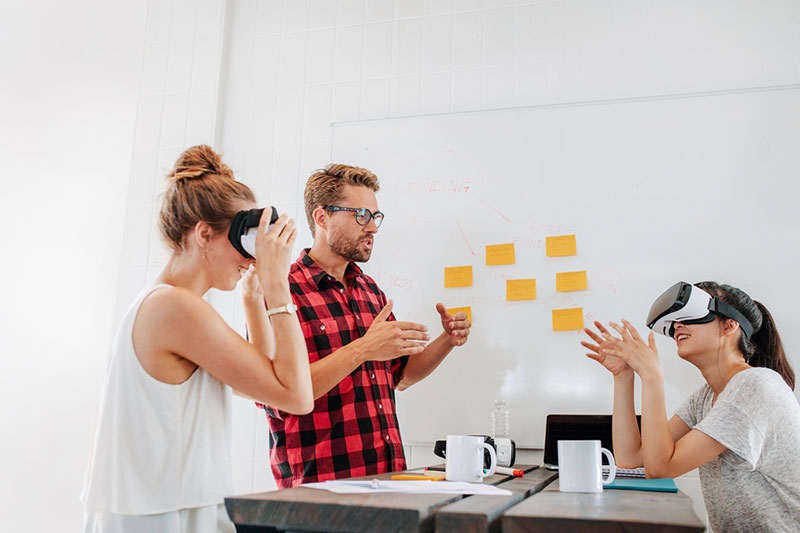Mobile technology revolutionized our culture. The unbridled freedom of access to everything we need, from anywhere we are.
Now, we have virtual reality (VR) and augmented reality (AR) technology. Once just a futuristic vision, “someday” has arrived. And businesses have the exciting opportunity to get a different perspective on their possibilities and choices.
With VR, users visually immerse themselves in a computer-generated environment.
AR adds a layer of digital context over the physical world. With AR, the user can react with the surrounding; with VR, they can only view it.
Both AR and VR technologies create possibilities for a wide range of industries.

Telemedicine
Untrained caregivers can remotely be directed, step by step, through potentially life-saving actions.
Two years ago, ten untrained volunteers were guided through the process of performing an ECG test, using an augmented reality app. In another example, Eyes-On glasses provides an AR view of the veins beneath a patient’s skin, making it easier to correctly insert a needle.
Field service
Technicians can perform diagnostics with the help of an AR overlay with the equipment’s maintenance history and specs. Then, he can access the manuals to do the repairs. If any help is needed, the technician can get help in the same way as telemedicine’s remote assistance.
Architecture and Construction
AR enables the architect or builder to walk through a computer-generated image of the design. They gain a more accurate feel for the flow of the building. Once the building is completed, this same AR can be used to give buyers, tenants, and investors a virtual tour of the property.
Manufacturers
You can use AR for prototyping, which will save time and money in the R & D phase.
Law Enforcement and the Military
These industries already use robotics to identify threats and protect their personnel. AR provides a broader, interactive view of a scenario. This same technology can be used in other high-risk industries (e.g., oil and gas, nuclear energy) where situations might pose a safety threat to workers.
Hospitality
The hospitality industry will use AR and VR to immerse guests in an experience to promote bookings. Imagine sitting in your office while also lying on a hammock under palm trees on a tropical beach.
Customer engagement will change, providing both a sales opportunity and a technical challenge for retail, marketing, and customer service organizations.
The new technology will allow customers to try on clothing using their avatar or walk through their kitchen renovation plan. Advertisers can leverage this platform to entice shoppers in entirely new and different ways!
Presentations will change. A PowerPoint can be embedded in VR. Presenters can simulate their presentation to rehearse and fine-tune it.
The Oculus Rift VR headset has fired up the passion for this next phase of immersion technology. Developers are actively at work on bringing businesses a different perspective.
Stay tuned for more advances!